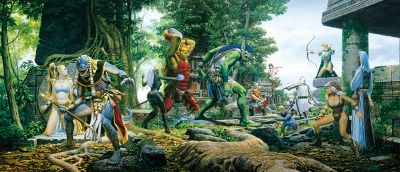Week 8 Class and Reading Reflection
Week eight’s reading, Productive Players: Online Computer Games’ Challenge to Conventional Media Forms by Sal Humphreys, discussed the blurring of boundaries between production and consumption of content and the necessity for the lines between social and economic relationships to be redrawn. The reading was based specifically upon Everquest. It raised the issue of implications coming from having productive players. As in Everquest, the players create the text, community, networks of relationships, systems of governance and characters. This then raises questions of whether a corporation can own these things, whether their profit from it is exploitation and who has the power within such a virtual space. In Everquest Sony relies upon the players to ‘make the game’. “This unpaid labour of the players is not peripheral to the commercial success of a game; it is central.” Is this outright exploitation!? I think this is a really interesting topic because it is one that is quite blurry and I can’t decide whether there is a right and wrong. If there is a wrong in what corporations such as Sony and Auran are doing then what is the answer?
This week’s class was the first of my seminars. We discussed virtual communities and then had to form groups in which to develop our own idea for a potential community. I don’t usually like working in groups but I’m finding in many of my creative industries subjects that it is a necessity. Collaboration is fundamental within the creative industries so it is something I need to get use to for my professional practice. So I have a cool group and it should be fun. We brainstormed some ideas and I think we are going to do something along the lines of a virtual community for theatre script writers. It will be somewhere that script writers can meet, share ideas and work collaboratively on a work that will eventually be produced. It will also be a place where theatre goers can discuss performances they have seen, critique them and critique the development of the scripts under development. It will be locally based, eg: Brisbane, with the opportunity for expansion to other major cities if it becomes viable. It will be a means for networking and developing both social and industry relationships while allowing people with talent and/or passion to have a creative outlet which may lead to them making it big. The end result being an actual public performance will make the community feel productive and give members a reason to come back and contribute. This idea is copyrighted by moi!!!




